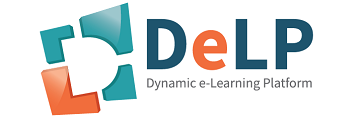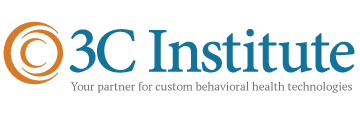
About the Platform
DeLP
This program is built on the powerful Dynamic e-Learning Platform (DeLP). Through more than a decade of federally-funded research, 3C Institute developed DeLP to provide unparalleled personalized, engaging, and effective e-learning programs. 3C developers work with subject matter partners to select and intermix DeLP components for didactic instruction (‘Tell me’ components), illustrative examples (‘Show me’ components), and practice opportunities (‘Let me try’ components), each customized to achieve specific learning objectives for a particular audience. DeLP can be applied for e-trainings for professional development (see https://www.3cisd.com/e-learning-for-professional-development) as well as self-paced intervention programs for behavior change (see https://www.3cisd.com/e-learning-for-behavior-change).
About the Platform Developers
3C Institute
Since 2001, 3C Institute has been building effective, user-friendly programs, services, and software applications to promote health and well-being for children, adolescents, and adults. At 3C, we collaborate with likeminded partners to apply our research-based technologies to accelerate and advance their research and intervention efforts. Our custom software services are tailored to achieve broad-scale improvement in social, emotional, and behavioral health. More information about 3C Institute can be found at www.3cisd.com.
About the Curriculum Authors

Katie C. Alexander,
OTD, MS, OTR/L
Katie C. Alexander, OTD, MS, OTR/L is an occupational therapist and clinician-researcher. Dr. Alexander received her BS, post-professional masters and doctorate from the University of Kansas Medical Center. For over 15 years, she has specialized in community and school-based intervention for individuals with neurodevelopmental disabilities and served as the founding program director for the Model Asperger Program at The Ivymount School. Her research and clinical interests are in developing research-and strengths-based interventions and supports that improve the daily lives of individuals with neurodevelopmental disabilities and their families. Dr. Alexander also works to disseminate evidence-based practices and improve interprofessional collaboration.

Laura Gutermuth Anthony, PhD
Laura Gutermuth Anthony, PhD, Associate Professor, Division of Child and Adolescent Psychiatry, Department of Psychiatry, University of Colorado School of Medicine, and the Pediatric Mental Health Institute at the Children’s Hospital Colorado. Dr. Anthony completed a dual degree PhD program in clinical and developmental psychology at the University of Illinois, Chicago in 1997. Since then, she has focused her most of her research and clinical work on children with neurodevelopmental disabilities and intervention development and implementation. She has also received funding for 11 federally-funded and 7 foundation research grants including several to study the Unstuck and On Target suite of interventions.

Lynn Cannon, M.Ed
Lynn Cannon, M.Ed is a social learning specialist at The Ivymount School and The Maddux School. Ms. Cannon received her M.ED in Special Education from the University of Virginia. For over 15 years, she has worked as an educator, administrator and program director, serving students with neurodevelopmental disabilities. Ms. Cannon is also a co-author of Solving Executive Challenges, a resource guide for teachers and parents, The Conversation Club, an instructional manual for teaching conversation skills to students with neurodevelopmental disabilities and the Ivymount Social Cognition Package, a comprehensive, online system for supporting social and emotional learning in K-8 students with high-functioning autism spectrum disorders. Her research and teaching interests are in developing interventions and support materials for students with neurodevelopmental disabilities, therapists, educators and their families.

Deb Childress, PhD
Dr. Childress obtained her PhD in psychology at the University of North Carolina at Chapel Hill. Prior to coming to 3C Institute, she served as a research associate and a postdoctoral fellow in the Carolina Institute for Developmental Disabilities at the University of North Carolina at Chapel Hill working on a longitudinal imaging study aimed at identifying the early markers of autism through behavioral and imaging methodologies. She has 20 years of autism research experience, during which she has examined the behavioral, personality, and cognitive characteristics of individuals with autism and their family members. Dr. Childress also has experience developing behavioral and parent report measurement tools, coordinating multi-site research studies, and collecting data from children and families. She has taught courses and seminars in general child development, autism, and cognitive development at the University of North Carolina at Chapel Hill.

Lauren Kenworthy, PhD
Lauren Kenworthy, PhD, is Professor of Neurology, Pediatrics, and Psychiatry at the George Washington University School of Medicine, and Director of the Center for Autism Spectrum Disorders at Children’s National Health System. Dr. Kenworthy received her BA from Yale University and PhD from the University of Maryland. Her research interests are in describing the cognitive strengths and treating the cognitive weaknesses of autism. She is an author of more than 70 peer-reviewed publications, and of the Behavior Rating Inventory of Executive Function (BRIEF), as well as the Unstuck and On-Target curricula. She has completed two trials of Unstuck and On-Target in schools for children with ADHD or ASD.

Suzanne Messina, MA
Suzanne Messina is a Senior Content Editor at 3C Institute, where she translates intervention content into interactive online courses for youth and adults to support social, emotional, and behavioral health. Her writing and editing experience includes technical and educational materials.

Monica Adler Werner, MA
Monica Adler Werner specializes in program development, executive function interventions in autism and parent coaching and support. While she currently works in private practice, she has worked extensively in schools to develop programming for children with Autism. She focusses on developing multidisciplinary teams that create child centered programming. The goal is always to explicitly teach skills that emphasize problem solving, self advocacy and self regulation–while keeping students on track academically. She is a coauthor of Unstuck and On Target (Brookes, 2011), a curriculum to enhance cognitive flexibility and problem solving in students with Autism and Solving Executive Function Challenges: Simple Ways to Get Kids with Autism Unstuck and on Target. Monica has an undergraduate degree from the University of Pennsylvania and a Masters degree from Johns Hopkins. She completed the coursework for her BCBA at Florida Institute of Technology and is working toward her Masters in Counseling (LCPC).




